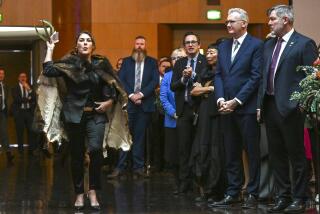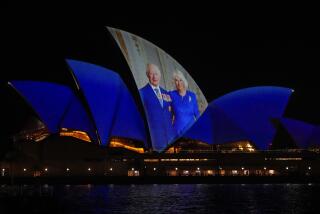Have a Foster’s for Australia! : After 200 Years, It Casts Off Its British Roots and Looks to Asia
- Share via
This week, as tall ships sail into magnificent Sydney Harbor to re-enact the first arrival of British convict vessels, Australia celebrates 200 years of European settlement.
Like a roll of silk when viewed from different angles, the nation seems British one moment, American the next--but its destiny lies in Asia.
Australia’s television channels are well stocked with “Dallas” and “Dynasty” and other such American programs. American popular music and clothing styles attract youth in Sydney and Melbourne as in much of the world. Yet Australian judges wear robes in the British manner. Cricket is a religion. News and views from London are prominent in print and on the airwaves. Knighthoods survive.
Long a British outpost--but from the onset of World War II subject to American cultural, technological and defense influences --Australia has begun to see itself as a unique civilization, a corner of the West tucked into the East.
Despite its 22,000 miles of coastline, this is one of the world’s most unthreatened nations. And one of the most uncluttered--only 16 million people in a land that is almost the size of the United States.
Sometimes known as the “lucky country,” Australia is a land of airy bungalows set in spacious gardens, steak for breakfast and a tenacious love of leisure hours.
If Australia is a comfortable land, its people can seem reticent about their rich inheritance. Disagreement exists as to which date is truly Australia’s national day. Capt. James Cook’s arrival on the East Coast 218 years ago? The first governor’s hoisting of the British flag near Sydney 18 years later (the anniversary being observed this week)? The day in 1901 when the six British colonies became states in the federation of Australia? Or the unknown day far in the mists of the past when the first blacks reached Australian shores?
Economically, Australia has been slipping. Terms of trade have gone against Australia’s primary products. Iron ore, nickel and a variety of energy resources have not proved a panacea. A protected manufacturing sector is too small and inefficient to innovate and export.
Yet for many Australians the diagnosis “crisis” leads to little more than a yawn and one more can of Foster’s beer. The problems do not seem all that desperate. The philosophy behind the bumper sticker “Avoid Hangovers, Stay Drunk” retains a hold over many Australians.
The Aussies are easy-going. There is an egalitarian spirit, although there is less equality of condition than there used to be. Even the very rich do not lock the gates of their mansions. Some of them parade their wealth, but, in a society that began as a prison, few of them can parade their status. Tycoon and bank clerk alike will probably ride beside the driver in the front seat of a taxi.
Australian nationalism has been rising. Movies of international repute, Aboriginal art, a vibrant theater depicting urban middle-class life and other branches of the arts have given Australians a new cultural confidence in themselves.
At the same time, Australia is a young nation with few glorious moments in its past, still in pursuit of its post-British identity. It takes time to overcome anxiety at remoteness, to feel truly at home in a natural environment that can be unpredictable and to come to terms with a regional setting, Asia, that is almost totally outside the traditions of Australia’s first 200 years.
While there is a coolness toward Britain at the back of the rising Australian nationalism, the attitude toward the United States is more nuanced. There is no “mother / daughter” resentment against America for condescending toward Australia, as there is against Britain.
The United States and Australia are both young nations and melting-pot nations. Perhaps for this reason the Australian is generally at ease with the American.
Australia, having begun as a government prison, was never really like Britain; it lacked an aristocracy, a dominant middle class and a deferential working class.
Today Australia has an impressive leader in thrice-elected Prime Minister Bob Hawke. A pragmatic and strongly nationalistic--but very pro-American--Labor Party man, Hawke recently told me that he hopes the world will appreciate three things about Australia at its Bicentenary: that Australians know their land is an ancient one that once belonged to the Aborigines and “increasingly accept their responsibility” toward the first inhabitants, that Australia intends to “take its place within the dynamic Asian region” and that Australia remains true to its “fair go” tradition--the social progressivism that made it a pioneer in the late 19th Century in democracy and workers’ rights.
“We are becoming Americanized only in the sense that we’re become universalized,” a former conservative cabinet minister told me in Melbourne. “It so happens that the United States is at the forefront of many things. The whole world is going in that direction.”
So Australia is becoming sharply less British. But in the process, as well as becoming more distinctively Australian, it is washed by a tide of diffuse influences.
Force of geography ensures that Australia will continue its gingerly steps into the Asian orbit. But this will not be rapid or total. Australia, like Japan, hangs at a tangent to its region. It may over a long period become to Asia what Japan is to the West--the most Asian nation of the West, as Japan is the most Western nation of the East.
More to Read
Sign up for The Wild
We’ll help you find the best places to hike, bike and run, as well as the perfect silent spots for meditation and yoga.
You may occasionally receive promotional content from the Los Angeles Times.






